The unforgivable sin happens when you deliberately reject the Holy Spirit’s influence, refusing to seek God’s mercy or forgiveness. It involves consciously turning away from divine grace, even after witnessing divine acts. This rejection indicates a hardened heart that refuses repentance, making forgiveness impossible. If you stay curious, you’ll discover how different faiths understand this profound concept and explore the boundaries of divine mercy and justice more deeply.
Key Takeaways
- The unforgivable sin, according to Jesus, is blasphemy against the Holy Spirit, involving deliberate rejection of divine grace.
- It entails knowingly attributing divine works, like healing, to evil forces, demonstrating a hardened heart.
- This sin is unforgivable because it reflects a willful refusal to repent and accept God’s mercy.
- It represents a conscious rebellion that severs the possibility of forgiveness and salvation.
- Interpretations vary, but it generally involves persistent rejection of divine truth and grace across Christian and other faith traditions.
Biblical Foundations of the Unforgivable Sin

Have you ever wondered what the Bible says about the unforgivable sin? The Scriptures highlight the importance of sacrificial offerings, emphasizing that they serve as a way to seek divine mercy. However, Jesus warns against rejecting the Holy Spirit, which is seen as a barrier to forgiveness. In Matthew 12:31-32, He states that blasphemy against the Spirit is unforgivable, because it involves willfully turning away from God’s grace. This highlights that, unlike other sins, the unforgivable sin stems from a hardened heart that refuses to accept divine mercy. The biblical foundation underscores that God’s willingness to forgive is genuine, but only if you genuinely seek forgiveness and do not persist in rejecting His sacrificial offerings.
The Meaning of Blasphemy Against the Holy Spirit
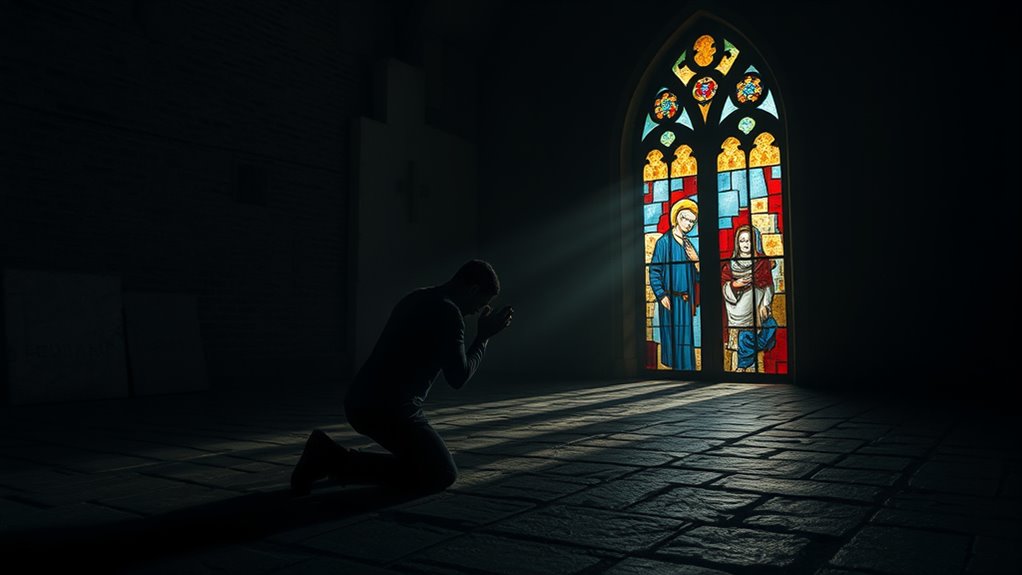
Blasphemy against the Holy Spirit is a serious and deliberate rejection of God’s grace that Jesus warns about in the Gospels. It involves knowingly attributing divine works, like faith healing, to evil forces instead of God’s power. This act shows a hardened heart that refuses to repent, risking divine wrath. When you dismiss the Holy Spirit’s influence, you reject the very source of salvation and forgiveness. This blasphemy isn’t just doubt; it’s a conscious rebellion against God’s work. The danger lies in closing yourself off from God’s mercy, making reconciliation impossible. Recognizing this is vital because it highlights the severity of turning away from the Holy Spirit’s conviction, which ultimately leads to eternal separation from God’s grace.
Historical Interpretations and Variations
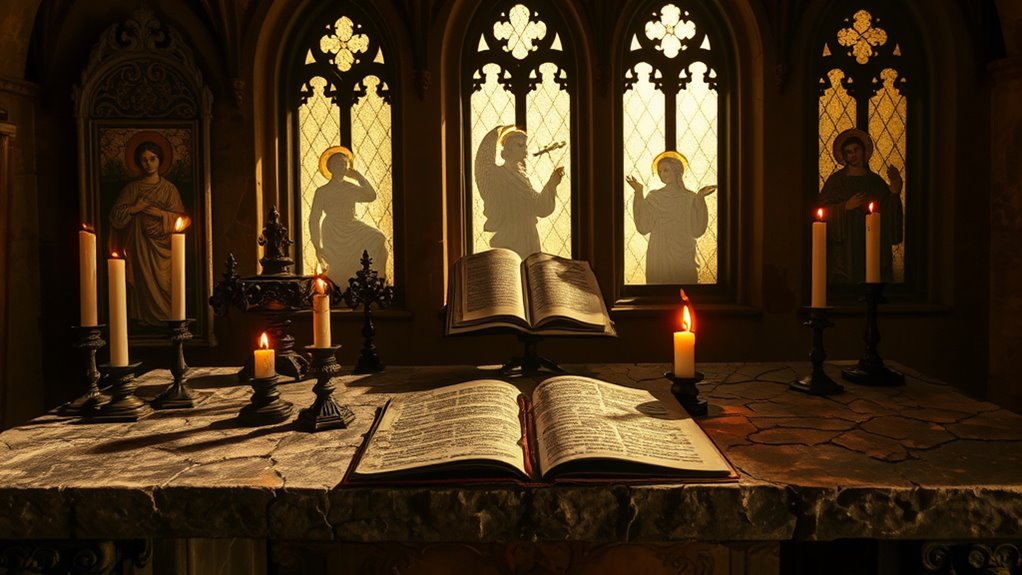
Throughout history, interpretations of blasphemy against the Holy Spirit have varied widely across different Christian traditions and theological perspectives. You’ll find that many view it through historical symbolism, seeing it as a specific act or attitude condemned in biblical times. Others consider cultural adaptations, recognizing that different societies have understood the sin in ways influenced by their unique beliefs and contexts. For example, some early Christian communities saw it as outright rejection of Christ, while others saw it as persistent opposition to divine truth. These variations reflect how interpretations evolved over centuries, shaped by social, political, and spiritual factors. Understanding this diversity helps you see that the unforgivable sin isn’t a fixed concept but one that has been understood differently throughout history.
Theological Perspectives Across Denominations
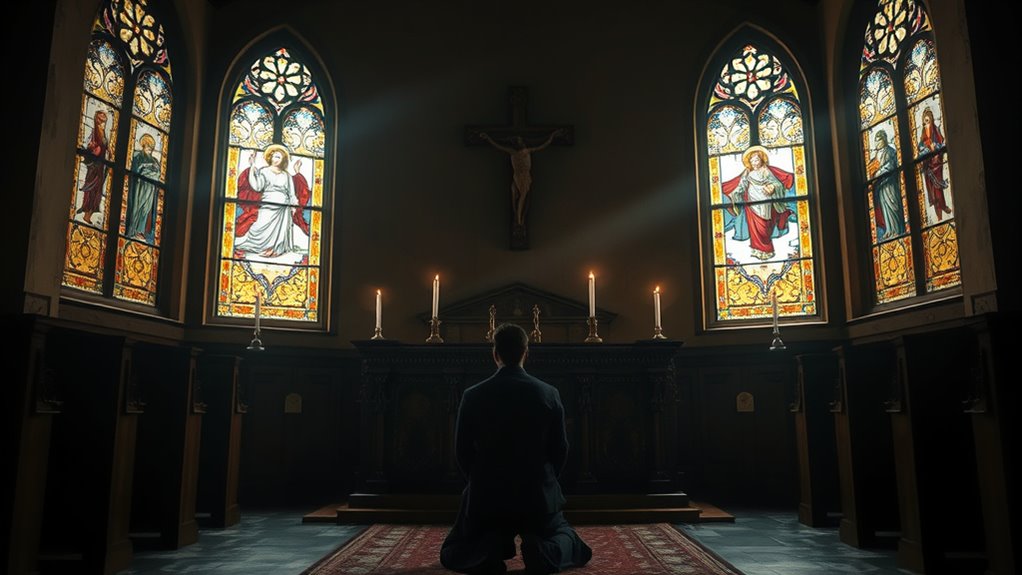
Different Christian denominations interpret the unforgivable sin in ways that reflect their unique theological traditions and teachings. Some see it as a deliberate rejection of faith and salvation, emphasizing the importance of divine mercy and repentance. Others interpret it as a specific act that severs your relationship with God, making reconciliation impossible.
You might feel overwhelmed by doubts, but remember: many traditions emphasize God’s infinite mercy and willingness to forgive.
- Feel the weight of spiritual separation, yet hope in divine mercy’s power to restore even the most broken souls.
- Recognize that faith is a journey, where salvation is always within reach if you turn back with humility.
- Understand that theological differences don’t diminish God’s boundless love for every individual.
Cultural and Religious Contexts
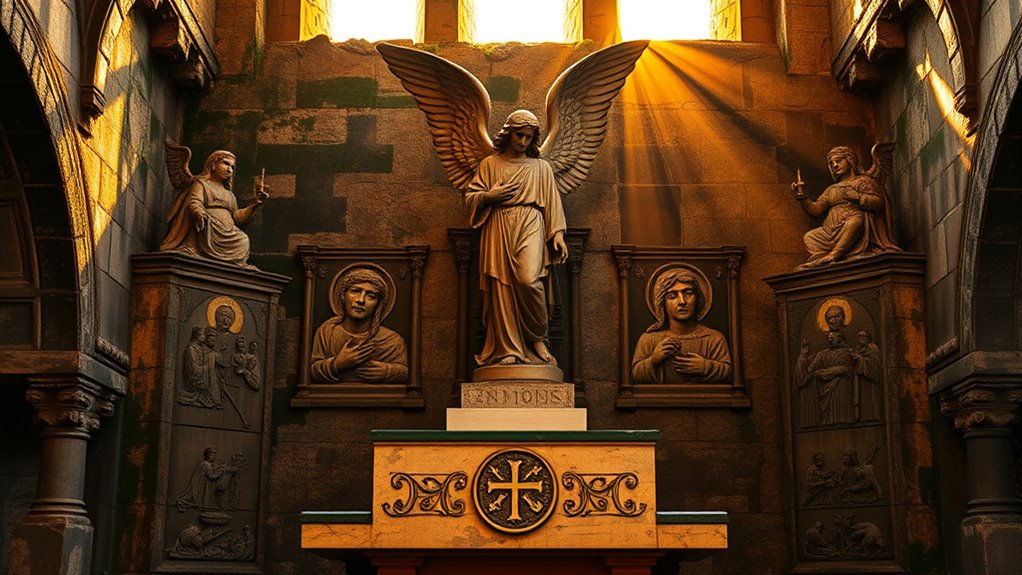
Cultural and religious contexts deeply influence how the unforgivable sin is understood and interpreted around the world. Different societies assign unique meanings through cultural symbolism and religious rituals, shaping perceptions of what constitutes an unforgivable act. For example:
| Culture/Religion | Symbolism or Ritual | View on Unforgivable Sin |
|---|---|---|
| Christianity | Blood sacrifice | Rejecting divine forgiveness |
| Hinduism | Karma and rebirth | Severe moral transgressions |
| Islam | Tawbah (repentance) | Persistent disbelief or shirk |
| Indigenous | Sacred traditions | Violating spiritual harmony |
These contexts show how societal values and spiritual practices influence interpretations, making the concept of an unforgivable sin deeply rooted in cultural symbolism and religious rituals.
Common Misunderstandings and Myths

Many people misunderstand what the unforgivable sin truly entails, often mistaking it for minor moral failings or assuming it’s impossible to seek forgiveness once committed. This confusion stems from moral ambiguity and misconceptions about supernatural phenomena. Some believe that only specific acts qualify, ignoring the broader spiritual context. Others think that once committed, the sin irreversibly condemns you, leading to despair. These myths diminish the true gravity of the sin and overlook the possibility of redemption. Remember, the unforgivable sin isn’t about simple mistakes or misjudgments. It’s rooted in a deliberate, persistent rejection of spiritual truth and grace.
- Believing that minor sins are equivalent to the unforgivable one.
- Assuming supernatural phenomena automatically seal your fate.
- Thinking forgiveness is impossible once the sin is committed.
Signs and Implications of Committing the Sin
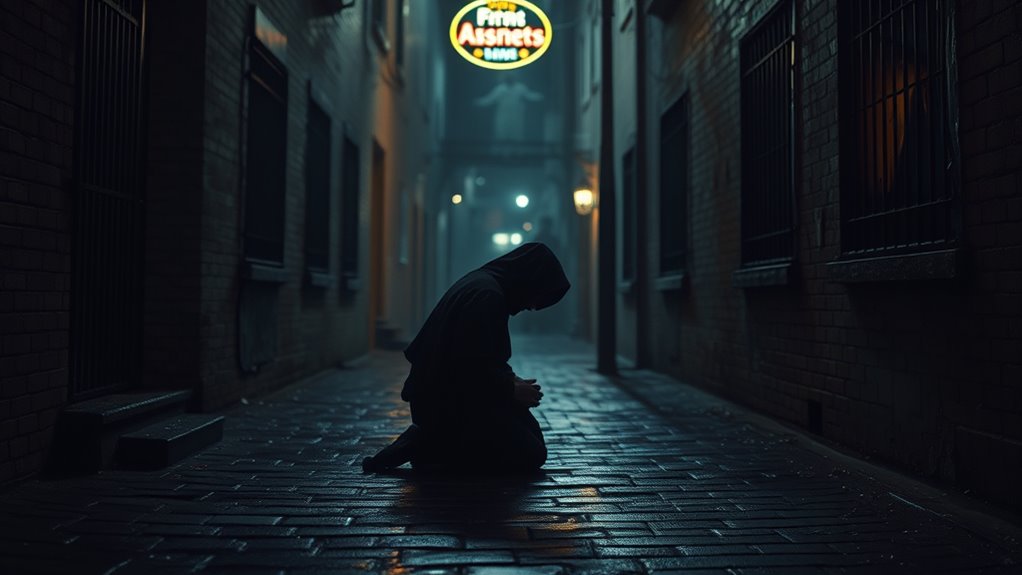
You may notice feelings of spiritual despair creeping in, making you feel distant from faith and hope. Socially, you might face isolation or strained relationships, while personally, guilt and regret weigh heavily on you. Recognizing these signs can help you understand the serious implications of this sin and seek the right path forward.
Signs of Spiritual Despair
Signs of spiritual despair often manifest as a deep sense of hopelessness and disconnection from faith, leading you to question your worth and divine presence. You might feel abandoned, as if your prayers go unheard. This despair can block your ability to seek faith healing or spiritual guidance, trapping you in darkness. You may notice these signs:
- Feeling entirely lost, with no sense of purpose or divine connection
- Believing that your sins are too great for forgiveness, even when seeking faith healing
- Losing trust in spiritual guidance, making it hard to find hope or clarity
Recognizing these signs is vital to addressing your despair and reconnecting with your faith. Remember, spiritual healing often begins with acknowledging your feelings and seeking support.
Social and Personal Consequences
What happens to your relationships and personal life when you commit the unforgivable sin? You may find your moral authority diminished, making it harder for others to trust or respect you. This act can isolate you from friends, family, and community, as your reputation suffers and others question your integrity. The societal impact is significant—your influence wanes, and you might even face condemnation or alienation from those around you. Internally, you could experience feelings of guilt, shame, or despair, which further damage your sense of self-worth. These consequences create a cycle of loneliness and regret, making it difficult to rebuild trust or restore your standing. Ultimately, the social and personal fallout emphasizes how deeply this sin can affect every aspect of your life.
The Debate Over Forgiveness and Divine Justice

The debate over forgiveness and divine justice centers on whether certain sins, like the unforgivable, can truly be forgiven by a higher power. You may wrestle with moral dilemmas, questioning if divine mercy extends to even the gravest offenses. Some argue that no sin is beyond forgiveness, emphasizing compassion and divine grace. Others believe that some acts are so heinous they challenge divine justice itself, making forgiveness impossible. This debate stirs deep emotional responses, as you consider the fate of those who commit unforgivable acts.
- The fear of eternal separation from divine mercy
- The hope that redemption is always possible
- The moral struggle between justice and mercy
How Different Faiths Address the Concept
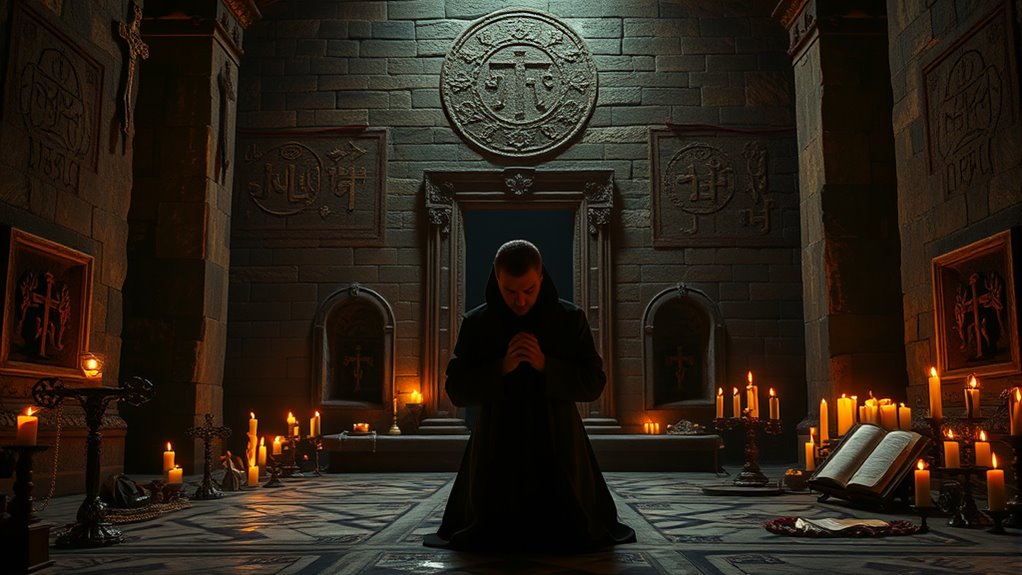
Different faiths approach the idea of forgiveness and divine justice in unique ways, shaping how followers understand what’s possible for even the most grievous sins. In interfaith dialogue, believers share perspectives, revealing that some traditions emphasize divine mercy, while others stress accountability. Comparative theology helps uncover these differences, showing how Christianity may highlight repentance and grace, whereas Islam emphasizes Allah’s mercy and the importance of seeking forgiveness. Buddhism, meanwhile, focuses on karma and personal transformation rather than divine judgment. Recognizing these diverse approaches deepens understanding and fosters respect among faiths. By examining how each tradition addresses the concept of divine justice, you see that the boundaries of forgiveness vary widely, influencing whether certain sins are deemed unforgivable or offer pathways to redemption.
Personal Reflection: Recognizing the Boundaries of Forgiveness

Reflecting on forgiveness often reveals personal boundaries shaped by your values, experiences, and beliefs. You may find that emotional boundaries define how much pain you’re willing to accept or forgive. Recognizing forgiveness limitations helps you understand when holding onto resentment becomes unhealthy or unjustifiable. It’s essential to honor these boundaries to protect your well-being.
Consider these emotional boundaries:
- When forgiving feels like sacrificing your sense of justice or self-respect
- When past wounds resurface, making genuine forgiveness impossible
- When attempts at reconciliation threaten your emotional safety
Frequently Asked Questions
Can Someone Unknowingly Commit the Unforgivable Sin?
You might wonder if you can unknowingly commit the unforgivable sin. It’s unlikely because this sin involves conscious rejection of faith and awareness of its gravity. An unintentional sin or subconscious guilt doesn’t equate to it, as you’re not intentionally dismissing spiritual truth. The key is awareness; if you’re unaware or acting out of ignorance, it’s not considered the unforgivable sin, which requires deliberate and knowing rejection.
Is the Unforgivable Sin Limited to Specific Religious Groups?
You might wonder if the unforgivable sin is limited to specific religious groups, and the answer varies. Interfaith perspectives and theological debates show that different traditions interpret this sin differently; some see it as unique to Christianity, while others believe it spans multiple faiths. You should consider these diverse views, understanding that the concept’s scope depends on individual beliefs, doctrinal teachings, and cultural contexts across religions.
How Does One Seek Forgiveness After Committing This Sin?
If you’re seeking forgiveness after committing this sin, you should start with sincere confession and repentance. Talk openly with a spiritual guide or trusted religious leader to gain clarity and support. They can help you understand the path to healing, encourage genuine remorse, and guide you through prayer or other spiritual practices. Remember, forgiveness often begins with humility and a sincere desire to reconnect with your faith and values.
Are There Modern Examples of Individuals Believed to Have Committed It?
You might wonder if modern misconceptions or theological debates suggest people have committed the unforgivable sin. While some claim certain actions or beliefs qualify, most religious teachings emphasize that repentance is always possible. No concrete examples exist of individuals definitively having committed it, as it’s rooted in a specific spiritual state rather than a modern act. Focus instead on understanding, forgiveness, and spiritual growth, regardless of debates surrounding the sin.
Has Anyone Been Officially Declared as Having Committed the Unforgivable Sin?
You wonder if anyone’s officially declared to have committed the unforgivable sin, and the answer’s complex. Historically, no one has been officially labeled as such, mainly because theological implications suggest it’s a matter of conscience rather than public recognition. While some claim others have committed it, church authorities haven’t officially declared anyone, highlighting the ongoing debate between personal belief, theological interpretation, and historical occurrences.
Conclusion
Just as Peter’s denial was forgiven after repentance, remember that divine mercy often surpasses our understanding. The unforgivable sin serves as a reminder to stay humble and attentive to the Holy Spirit’s whisper. While some see it as a boundary, others view it as a call to seek grace. Ultimately, like the prodigal son, you’re invited to return, for no sin is beyond the reach of divine forgiveness if you genuinely seek it.










